- Home
- Peter S. Beagle
The Last Unicorn Page 4
The Last Unicorn Read online
Page 4
Forgetting where she was, the unicorn pressed forward against the bars. They hurt her, but she did not draw back. “The Red Bull,” she said. “Where can I find the Red Bull?”
Mommy Fortuna stepped very close to the cage. “The Red Bull of King Haggard,” she muttered. “So you know of the Bull.” She showed two of her teeth. “Well, he’ll not have you,” she said. “You belong to me.”
The unicorn shook her head. “You know better,” she answered gently. “Free the harpy, while there is time, and set me free as well. Keep your poor shadows, if you will, but let us go.”
The witch’s stagnant eyes blazed up so savagely bright that a ragged company of luna moths, off to a night’s revel, fluttered straight into them and sizzled into snowy ashes. “I’d quit show business first,” she snarled. “Trudging through eternity, hauling my homemade horrors—do you think that was my dream when I was young and evil? Do you think I chose this meager magic, sprung of stupidity, because I never knew the true witchery? I play tricks with dogs and monkeys because I cannot touch the grass, but I know the difference. And now you ask me to give up the sight of you, the presence of your power. I told Rukh I’d feed his liver to the harpy if I had to, and so I would. And to keep you I’d take your friend Schmendrick, and I’d—” She raged herself to gibberish, and at last to silence.
“Speaking of livers,” the unicorn said. “Real magic can never be made by offering up someone else’s liver. You must tear out your own, and not expect to get it back. The true witches know that.”
A few grains of sand rustled down Mommy Fortuna’s cheek as she stared at the unicorn. All witches weep like that. She turned and walked swiftly toward her wagon, but suddenly she turned again and grinned her rubbly grin. “But I tricked you twice, anyway,” she said. “Did you really think that those gogglers knew you for yourself without any help from me? No, I had to give you an aspect they could understand, and a horn they could see. These days, it takes a cheap carnival witch to make folk recognize a real unicorn. You’d do much better to stay with me and be false, for in this whole world only the Red Bull will know you when he sees you.” She disappeared into her wagon, and the harpy let the moon come out again.
Chapter 3
Schmendrick came back a little before dawn, slipping between the cages as silently as water. Only the harpy made a sound as he went by. “I couldn’t get away any sooner,” he told the unicorn. “She’s set Rukh to watching me, and he hardly ever sleeps. But I asked him a riddle, and it always takes him all night to solve riddles. Next time, I’ll tell him a joke and keep him busy for a week.”
The unicorn was gray and still. “There is magic on me,” she said. “Why did you not tell me?”
“I thought you knew,” the magician answered gently. “After all, didn’t you wonder how it could be that they recognized you?” Then he smiled, which made him look a little older. “No, of course not. You never would wonder about that.”
“There has never been a spell on me before,” the unicorn said. She shivered long and deep. “There has never been a world in which I was not known.”
“I know exactly how you feel,” Schmendrick said eagerly. The unicorn looked at him out of dark, endless eyes, and he smiled nervously and looked at his hands. “It’s a rare man who is taken for what he truly is,” he said. “There is much misjudgment in the world. Now, I knew you for a unicorn when I first saw you, and I know that I am your friend. Yet you take me for a clown, or a clod, or a betrayer, and so must I be if you see me so. The magic on you is only magic and will vanish as soon as you are free, but the enchantment of error that you put on me I must wear forever in your eyes. We are not always what we seem, and hardly ever what we dream. Still I have read, or heard it sung, that unicorns when time was young, could tell the difference ’twixt the two—the false shining and the true, the lips’ laugh and the heart’s rue.” His quiet voice lifted as the sky grew lighter, and for a moment the unicorn could not hear the bars whining, or the soft ringing of the harpy’s wings.
“I think you are my friend,” she said. “Will you help me?”
“If not you, no one,” the magician answered. “You are my last chance.”
One by one, the sad beasts of the Midnight Carnival came whimpering, sneezing, and shuddering awake. One had been dreaming of rocks and bugs and tender leaves; another of bounding through high, hot grass; a third of mud and blood. And one had dreamed of a hand scratching the lonely place behind its ears. Only the harpy had not slept, and now she sat staring into the sun without blinking. Schmendrick said, “If she frees herself first, we are lost.”
They heard Rukh’s voice nearby—that voice always sounded nearby—calling, “Schmendrick! Hey, Schmendrick, I got it! It’s a coffeepot, right?” The magician began to move slowly away. “Tonight,” he murmured to the unicorn. “Trust me till dawn.” And was gone with a flap and a scramble, seeming as before to leave part of himself behind. Rukh loped by the cage a moment later, all deadly economy. Hidden in her black wagon, Mommy Fortuna grumbled Elli’s song to herself.
Here is there, and high is low;
All may be undone.
What is true, no two men know—
What is gone is gone.
Soon a new catch of spectators began to come sauntering up to see the show. Rukh called them in, crying, “Creatures of night!” like an iron parrot, and Schmendrick stood on a box and did tricks. The unicorn watched him with great interest and a growing uncertainty, not of his heart but of his craft. He made an entire sow out of a sow’s ear; turned a sermon into a stone, a glass of water into a handful of water, a five of spades into a twelve of spades, and a rabbit into a goldfish that drowned. Each time he conjured up confusion, he glanced quickly at the unicorn with eyes that said, “Oh, but you know what I really did.” Once he changed a dead rose into a seed. The unicorn liked that, even though it did turn out to be a radish seed.
The show began again. Once more Rukh led the crowd from one of Mommy Fortuna’s poor fables to another. The dragon blazed, Cerberus howled for Hell to come and help him, and the satyr tempted women until they wept. They squinted and pointed at the manticore’s yellow tusks and swollen sting; grew still at the thought of the Midgard Serpent; and wondered at Arachne’s new web, which was like a fisherman’s net with the dripping moon in it. Each of them took it for a real web, but only the spider believed that it held the real moon.
This time, Rukh did not tell the story of King Phineus and the Argonauts; indeed, he hurried his sightseers past the harpy’s cage as quickly as he could, gabbling only her name and the meaning of it. The harpy smiled. Nobody saw her smile except the unicorn, and she wished that she had chanced to be looking somewhere else at the time.
When they stood in front of her cage, gazing silently in at her, the unicorn thought bitterly, Their eyes are so sad. How much sadder would they be, I wonder, if the spell that disguises me dissolved and they were left staring at a common white mare? The witch is right—not one would know me. But then a soft voice, rather like the voice of Schmendrick the Magician, said inside her, But their eyes are so sad.
And when Rukh shrieked, “Behold the Very End!” and the black hangings slithered back to reveal Elli, mumbling in the cold and the darkness, the unicorn felt the same helpless fear of growing old that set the crowd to flight, even though she knew that it was only Mommy Fortuna in the cage. She thought, The witch knows more than she knows she knows.
Night came quickly, perhaps because the harpy hurried it on. The sun sank into dirty clouds like a stone into the sea, and with about as much chance of rising again, and there was no moon, or any stars. Mommy Fortuna made her gliding rounds of the cages. The harpy did not move when she drew near, and that made the old woman stand and stare at her for a long while.
“Not yet,” she muttered at last, “not yet,” but her voice was weary and doubtful. She peered briefly at the unicorn, her eyes a stir of yellow in the greasy gloom. “Well, one day more,” she
said in a cackling sigh, and turned away again.
There was no sound in the Carnival after she was gone. All the beasts were asleep, save the spider, who wove, and the harpy, who waited. Yet the night creaked tighter and tighter, until the unicorn expected it to split wide open, ripping a seam down the sky, to reveal—More bars, she thought. Where is the magician?
At last he came hurrying through the silence, spinning and dancing like a cat in the cold, stumbling over shadows. When he reached the unicorn’s cage, he made a joyful bow to her and said proudly, “Schmendrick is with you.” In the cage nearest to hers, the unicorn heard the edged shivering of bronze.
“I think we have very little time,” she said. “Can you truly set me free?”
The tall man smiled, and even his pale, solemn fingers grew merry. “I told you that the witch has made three great mistakes. Your capture was the last, and the taking of the harpy the second, because you are both real, and Mommy Fortuna can no more make you hers than she can make the winter a day longer. But to take me for a mountebank like herself—that was her first and fatal folly. For I too am real. I am Schmendrick the Magician, the last of the red-hot swamis, and I am older than I look.”
“Where is the other?” the unicorn asked.
Schmendrick was pushing back his sleeves. “Don’t worry about Rukh. I asked him another riddle, one that has no answer. He may never move again.”
He spoke three angled words and snapped his fingers. The cage disappeared. The unicorn found herself standing in a grove of trees—orange and lemon, pear and pomegranate, almond and acacia—with soft spring earth under her feet, and the sky growing over her. Her heart turned light as smoke, and she gathered up the strength of her body for a great bound into the sweet night. But she let the leap drift out of her, untaken, for she knew, although she could not see them, that the bars were still there. She was too old not to know.
“I’m sorry,” Schmendrick said, somewhere in the dark. “I would have liked it to be that spell that freed you.”
Now he sang something cold and low, and the strange trees blew away like dandelion down. “This is a surer spell,” he said. “The bars are now as brittle as old cheese, which I crumble and scatter, so.” Then he gasped and snatched his hands away. Each long finger was dripping blood.
“I must have gotten the accent wrong,” he said hoarsely. He hid his hands in his cloak and tried to make his voice light. “It comes and goes.”
A scratching of flinty phrases this time, and Schmendrick’s bloody hands flickering across the sky. Something gray and grinning, something like a bear, but bigger than a bear, something that chuckled muddily, came limping from somewhere, eager to crack the cage like a nut and pick out bits of the unicorn’s flesh with its claws. Schmendrick ordered it back into the night, but it wouldn’t go.
The unicorn backed into a corner and lowered her head; but the harpy stirred softly in her cage, ringing, and the gray shape turned what must have been its head and saw her. It made a foggy, globbering sound of terror, and was gone.
The magician cursed and shivered. He said, “I called him up one other time, long ago. I couldn’t handle him then either. Now we owe our lives to the harpy, and she may yet come to call for them before the sun rises.” He stood silent, twisting his wounded fingers, waiting for the unicorn to speak. “I’ll try once more,” he said finally. “Shall I try once more?”
The unicorn thought that she could still see the night boiling where the gray thing had been. “Yes,” she said.
Schmendrick took a deep breath, spat three times, and spoke words that sounded like bells ringing under the sea. He scattered a handful of powder over the spittle, and smiled triumphantly as it puffed up in a single silent flash of green. When the light had faded, he said three more words. They were like the noise bees might make buzzing on the moon.
The cage began to grow smaller. The unicorn could not see the bars moving, but each time Schmendrick said, “Ah, no!” she had less room in which to stand. Already she could not turn around. The bars were drawing in, pitiless as the tide or the morning, and they would shear through her until they surrounded her heart, which they would keep a prisoner forever. She had not cried out when the creature Schmendrick had summoned came, grinning, toward her, but now she made a sound. It was small and despairing, but not yet yielding.
Schmendrick stopped the bars, though she never knew how. If he spoke any magic, she had not heard it; but the cage stopped shrinking a breath before the bars touched her body. She could feel them all the same, each one like a little cold wind, miaowing with hunger. But they could not reach her.
The magician’s arms fell to his sides. “I dare no more,” he said heavily. “The next time, I might not be able…” His voice trailed miserably away, and his eyes were as defeated as his hands. “The witch made no mistake in me,” he said.
“Try again,” the unicorn said. “You are my friend. Try again.”
But Schmendrick, smiling bitterly, was fumbling through his pockets in search of something that clicked and clinked. “I knew it would come to this,” he muttered. “I dreamed it differently, but I knew.” He brought out a ring from which dangled several rusty keys. “You deserve the services of a great wizard,” he said to the unicorn, “but I’m afraid you’ll have to be glad of the aid of a second-rate pickpocket. Unicorns know nought of need, or shame, or doubt, or debt—but mortals, as you may have noticed, take what they can get. And Rukh can only concentrate on one thing at a time.”
The unicorn was suddenly aware that every animal in the Midnight Carnival was awake, making no sound, but watching her. In the next cage, the harpy began to stamp slowly from one foot to the other. “Hurry,” the unicorn said. “Hurry.”
Schmendrick was already fitting a key into the snickering lock. At his first attempt, which failed, the lock fell silent, but when he tried another key it cried out loudly, “Ho-ho, some magician! Some magician!” It had Mommy Fortuna’s voice.
“Ah, turn blue,” the magician mumbled, but the unicorn could feel him blushing. He twisted the key, and the lock snapped open with one last grunt of contempt. Schmendrick swung the cage door wide and said softly, “Step down, lady. You are free.”
The unicorn stepped lightly to the ground, and Schmendrick the Magician drew back in sudden wonder. “Oh,” he whispered. “It was different when there were bars between us. You looked smaller, and not as—oh. Oh my.”
She was home in her forest, which was black and wet and ruined because she had been gone so long. Someone was calling to her from a long way off but she was home, warming the trees and waking the grass.
Then she heard Rukh’s voice, like a boat bottom gritting on pebbles. “Okay, Schmendrick, I give up. Why is a raven like a writing desk?” The unicorn moved away into deepest shadow, and Rukh saw only the magician and the empty, dwindled cage. His hand jumped to his pocket and came away again. “Why, you thin thief,” he said, grinning iron. “She’ll string you on barbed wire to make a necklace for the harpy.” He turned then and headed straight for Mommy Fortuna’s wagon.
“Run,” the magician said. He made a frantic, foolish, flying leap and landed on Rukh’s back, hugging the dark man dumb and blind with his long arms. They fell together, and Schmendrick scrambled up first, his knees nailing Rukh’s shoulders to the earth. “Barbed wire,” he gasped. “You pile of stones, you waste, you desolation, I’ll stuff you with misery till it comes out of your eyes. I’ll change your heart into green grass, and all you love into a sheep. I’ll turn you into a bad poet with dreams. I’ll set all your toenails growing inward. You mess with me.”
Rukh shook his head and sat up, hurling Schmendrick ten feet away. “What are you talking about?” He chuckled. “You can’t turn cream into butter.” The magician was getting to his feet, but Rukh pushed him back down and sat on him. “I never did like you,” he said pleasantly. “You give yourself airs, and you’re not very strong.” Heavy as night, his hands closed on the mag
ician’s throat.
The unicorn did not see. She was out at the farthest cage, where the manticore growled and whimpered and lay flat. She touched the point of her horn to the lock, and was gone to the dragon’s cage without looking back. One after another, she set them all free—the satyr, Cerberus, the Midgard Serpent. Their enchantments vanished as they felt their freedom, and they leaped and lumbered and slithered away into the night, once more a lion, an ape, a snake, a crocodile, a joyous dog. None of them thanked the unicorn, and she did not watch them go.
Only the spider paid no mind when the unicorn called softly to her through the open door. Arachne was busy with a web which looked to her as though the Milky Way had begun to fall like snow. The unicorn whispered, “Weaver, freedom is better, freedom is better,” but the spider fled unhearing up and down her iron loom. She never stopped for a moment, even when the unicorn cried, “It’s really very attractive, Arachne, but it’s not art.” The new web drifted down the bars like snow.
Then the wind began. The spiderweb blew across the unicorn’s eyes and disappeared. The harpy had begun to beat her wings, calling her power in, as a crouching wave draws sand and water roaring down the beach. A bloodshot moon burst out of the clouds, and the unicorn saw her—swollen gold, her streaming hair kindling, the cold, slow wings shaking the cage. The harpy was laughing.
In the shadow of the unicorn’s cage, Rukh and Schmendrick were on their knees. The magician was clutching the heavy ring of keys, and Rukh was rubbing his head and blinking. Their faces were blind with terror as they stared at the rising harpy, and they leaned together in the wind. It blew them against one another, and their bones rang.
The unicorn began to walk toward the harpy’s cage. Schmendrick the Magician, tiny and pale, kept opening and closing his mouth at her, and she knew what he was shrieking, though she could not hear him. “She will kill you, she will kill you! Run, you fool, while she’s still a prisoner! She will kill you if you set her free!” But the unicorn walked on, following the light of her horn, until she stood before Celaeno, the Dark One.

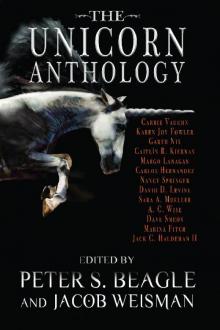 The Unicorn Anthology.indb
The Unicorn Anthology.indb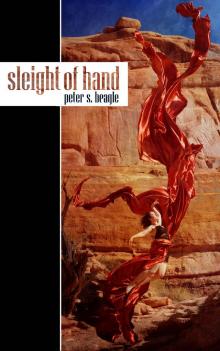 Sleight of Hand
Sleight of Hand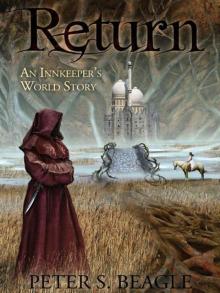 Return
Return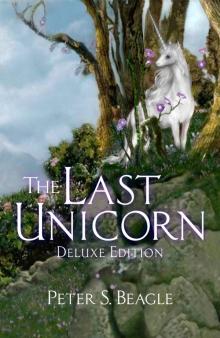 The Last Unicorn
The Last Unicorn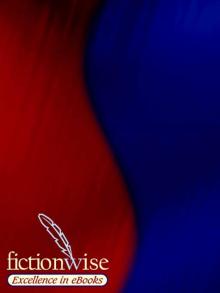 Two Hearts
Two Hearts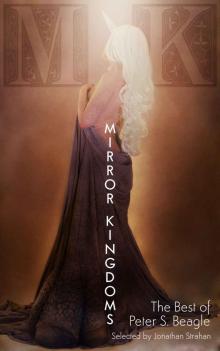 Mirror Kingdoms: The Best of Peter S. Beagle
Mirror Kingdoms: The Best of Peter S. Beagle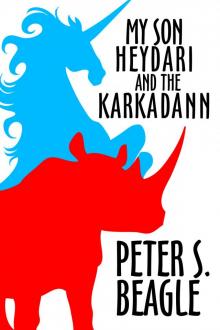 My Son Heydari and the Karkadann
My Son Heydari and the Karkadann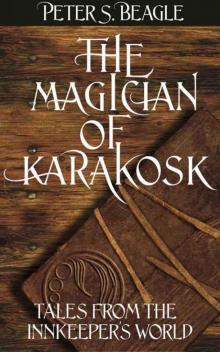 The Magician of Karakosk, and Other Stories
The Magician of Karakosk, and Other Stories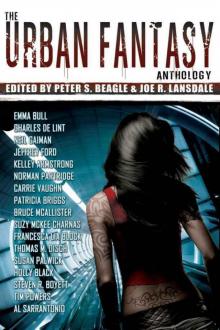 The Urban Fantasy Anthology
The Urban Fantasy Anthology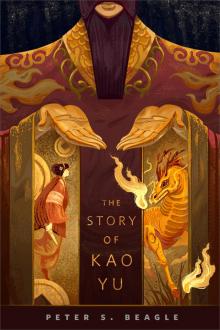 The Story of Kao Yu
The Story of Kao Yu The Karkadann Triangle
The Karkadann Triangle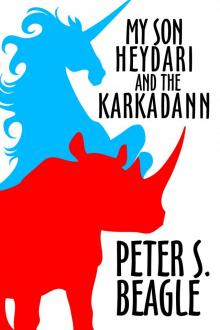 My Son and the Karkadann
My Son and the Karkadann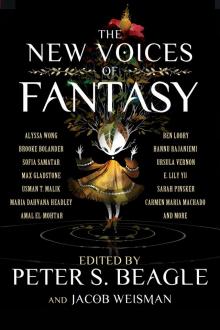 The New Voices of Fantasy
The New Voices of Fantasy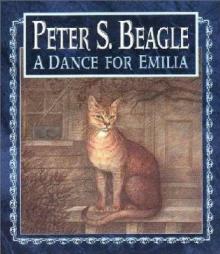 A Dance for Emilia
A Dance for Emilia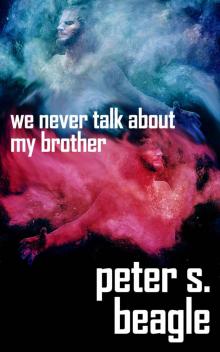 We Never Talk About My Brother
We Never Talk About My Brother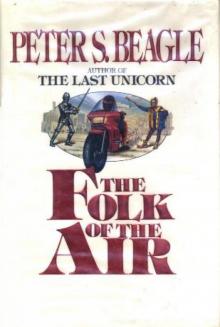 The Folk Of The Air
The Folk Of The Air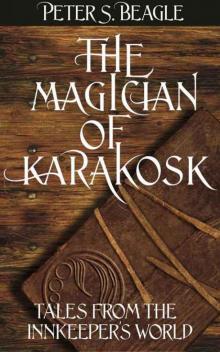 The Magician of Karakosk: Tales from the Innkeeper's World
The Magician of Karakosk: Tales from the Innkeeper's World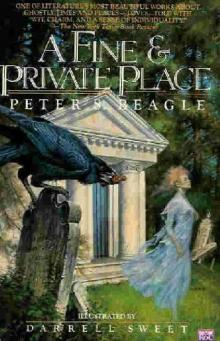 A Fine and Private Place
A Fine and Private Place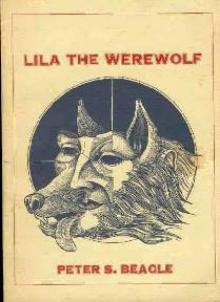 Lila The Werewolf
Lila The Werewolf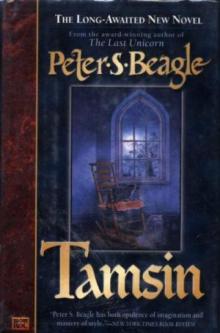 Tamsin
Tamsin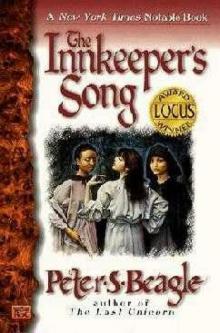 Innkeeper's Song
Innkeeper's Song